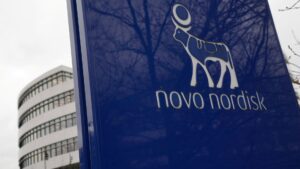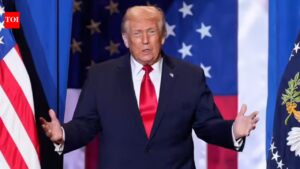Prosecution Rests in Trial of Former Theranos President Ramesh ‘Sunny’ Balwani

Prosecutors on Friday rested their case against Ramesh “Sunny” Balwani—the top deputy and confidant to Theranos Inc. founder
Elizabeth Holmes
—as the government seeks another fraud conviction against the leaders of the defunct blood-testing startup.
Over nine weeks that included testimony from 24 witnesses in San Jose, Calif., prosecutors sought to convince a jury that Mr. Balwani conspired with Ms. Holmes to defraud investors and patients about the startup’s technology and blood-testing capabilities. Although Ms. Holmes was the company’s chief executive and founder, Mr. Balwani, as Theranos’s second-in-command and her longtime boyfriend, had enormous power at the Silicon Valley company and was a full participant in the fraud scheme, government attorneys have alleged.
Mr. Balwani, 56 years old, faces 12 counts of wire fraud and conspiracy to commit wire fraud. He joined Theranos in 2009 as vice chairman of its board and the following year became president and chief operating officer, a position he held until 2016. He also helped finance the company by underwriting a $13 million loan and buying $5 million in stock.
“After Balwani joined the company, he and Elizabeth Holmes began making grandiose spectacular claims about Theranos’s capabilities and its accomplishments,” Assistant U.S. Attorney Robert Leach told the jury. Those never materialized and Theranos was running out of money, so “they decided to deceive and cheat,” Mr. Leach said.
Attorneys for Mr. Balwani have put the responsibility for Theranos squarely on Ms. Holmes, saying she had spent six years building the company before Mr. Balwani joined, and that Theranos had hundreds of millions of dollars in the bank at the time that he left. Also on Friday, Mr. Balwani’s attorneys began their defense of their client, calling their first witness—a naturopathic physician from Arizona who sent more than 150 patients to Theranos and used the company’s blood tests herself.
The government’s case against Mr. Balwani mostly mirrored the one against Ms. Holmes, who is awaiting sentencing in September after a jury in January convicted her of one count of conspiracy to commit wire fraud and three counts of wire fraud for intentionally deceiving investors. Her attorneys made a verbal motion with the judge asking for an acquittal and have said she would appeal any guilty verdict.
Jeffrey Coopersmith, an attorney for Mr. Balwani, also made a verbal motion for an acquittal of his client at the conclusion of the government’s case. The judge deferred a decision.
Theranos raised about $945 million from investors before going bust in 2018, following a federal indictment, civil lawsuits, Securities and Exchange Commission charges and regulatory scrutiny that closed its lab operations.
The conclusion of the government’s case against Mr. Balwani comes three years after he and Ms. Holmes were indicted together in a rare white-collar criminal case against Silicon Valley startup executives. Both asked for their trials to be severed and a federal judge granted the request. The Covid-19 pandemic, Ms. Holmes’s pregnancy and the challenge of finding a jury for a closely watched case delayed both trials. A juror was excused Friday due to being exposed to Covid-19, and an alternate juror assumed the seat.
In Ms. Holmes’s case, the jury acquitted her on four of the charges related to patients who had taken Theranos tests and said they received inaccurate results, and the government was forced to drop a fifth count after making an error. In Mr. Balwani’s trial, the government tried to improve its case around alleged patient fraud. It restored the charge it had been forced to drop in Ms. Holmes’s trial, which regarded patient Brent Bingham, a Phoenix-based retiree and rock climber. Mr. Bingham testified this week that blood-platelet count results he received from Theranos were incorrect.
Mr. Balwani’s case missed some of the high-profile witnesses who testified in Ms. Holmes’s case, including former Defense Secretary
Jim Mattis.
Mr. Balwani had unfettered access to all aspects of the company—and was fully informed about its many technical and clinical problems and cash shortfalls, government witnesses testified. And crucially, he oversaw the company’s lab operations, and was still responsible for the lab when a federal regulatory inspection uncovered serious deficiencies.
“He sought to know everything he could about everything,” Mark Pandori, Theranos lab director from 2013 to 2014, testified in March.
A former
executive testified that Mr. Balwani was in charge of Theranos’s relationship with the drugstore retailer, supplying regular updates on its technology and detailing why Theranos did about 40% of its blood draws using the traditional needle-in-the arm method and not its proprietary finger-prick technology.
Prosecutors allege that Mr. Balwani was responsible for misleading financial models shown to investors, which overstated Theranos’s revenue by as much as nine times the company’s own internal projections. Brian Grossman of hedge fund PFM Health Sciences LP testified that Mr. Balwani had supplied his team with the financial model for the company that informed their decision to invest a total of $96 million. Theranos told investors to expect about $990 million in revenue in 2015, when the reality was the company had less than $2 million in sales that year.
“We did take their estimates and we used those,” Mr. Grossman testified Friday.
Theranos claimed its blood-testing device could cheaply and quickly run more than 200 health tests using a proprietary device. The government argued and evidence in Ms. Holmes’s case showed that Theranos managed to use its proprietary finger-prick blood-testing device for just 12 types of patient tests, and those results were unreliable.
The government also alleges Theranos misrepresented its operations and capabilities to investors and business partners including Walgreens with false claims that its technology had been validated by pharmaceutical giants and was being used in medical evacuation helicopters by the U.S. military.
When a prosecutor presented Tracy Wooten, the Arizona-based doctor, with Theranos’s internal emails that detailed unreliable test results, she said she would still be comfortable sending her patients to Theranos even had she known about the problems at the time.
“Other labs make honest mistakes, too,” Dr. Wooten said.
Theranos had voided some of her patients’ test results, testimony showed. Dr. Wooten about six years ago had taken a hormone test known as hCG with Theranos, which confirmed she was pregnant. She had previously taken a urine test. That was after Theranos’s lab director in 2014 had ordered the company to halt hCG tests because the results were unreliable, according to evidence presented by the government. Another patient testified for the government that she had received an hCG test result that led her to believe she was miscarrying when she was in fact carrying a healthy pregnancy.
A prosecutor also showed Dr. Wooten a copy of a test message for November 2014 that Mr. Balwani sent to Ms. Holmes, calling Theranos’s lab a “disaster zone.” He asked Dr. Wooten again whether she would have sent her patients to Theranos had she known that.
“Probably not,” Dr. Wooten said.
Write to Heather Somerville at Heather.Somerville@wsj.com
Copyright ©2022 Dow Jones & Company, Inc. All Rights Reserved. 87990cbe856818d5eddac44c7b1cdeb8







